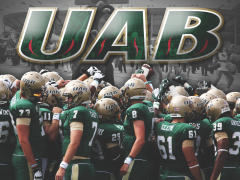 By JAY REEVES and JOHN ZENOR
By JAY REEVES and JOHN ZENOR
BIRMINGHAM, Ala. (AP) — UAB is shutting down the football program after one of the Blazers’ stronger seasons, the first school to make that cost-cutting move in nearly two decades.
The university announced the decision Tuesday minutes after President Ray Watts met with the Blazers players and coaches, while several hundred UAB students and fans gathered outside for the third straight day in efforts to support the program. UAB made the decision after a campus-wide study conducted by a consulting firm over the past year.
“The fiscal realities we face — both from an operating and a capital investment standpoint — are starker than ever and demand that we take decisive action for the greater good of the Athletic Department and UAB,” Watts said in a statement released by the university. “As we look at the evolving landscape of NCAA football, we see expenses only continuing to increase. When considering a model that best protects the financial future and prominence of the Athletic Department, football is simply not sustainable.”
UAB said in the release that it subsidizes $20 million of the athletic department’s operating budget of some $30 million annually, and said both those numbers rank fifth in Conference USA. The university said the difference over the next five years would be an extra $49 million with football, including a projected $22 million needed for football facilities and upgrades.
Despite the numbers outlined by UAB, Watts insisted at an afternoon news conference that the decision “is not about financial woes. This is about planning for excellence in the future in everything we do.”
UAB is the first major college program since Pacific in 1995 to shut down.
Players cried and hugged after leaving the meeting. An emotional coach Bill Clark, who just completed his first season with a 6-6 record, briefly addressed supporters, saying players, families and coaches were all hurting. UAB is eligible for only its second bowl appearance and first since 2004.
“This is one of the most difficult days that I have had to endure in my personal as well as my coaching career,” Clark said in a statement. “I am absolutely heartbroken for my players and my assistant coaches.”
He has two years left on a contract worth $500,000 annually. Watts wouldn’t give the specific cost of shutting down football. UAB’s deal for the opener with Tennessee alone called for either school to pay $925,000 to get out of the game.
UAB tight end Brandon Prince, 20, transferred from Austin Peay back to his hometown to help his ailing father. Now, he’s not sure where he’ll be able to do what he loves most: Play football.
“It’s like SMU,” Prince said. “We got the death penalty without any NCAA violations.”
Eliminating football jeopardizes UAB’s membership in Conference USA and associated programs including the school’s marching band, though the school said it hopes to remain in the league and Division I. Members of the band and cheerleaders joined in protests on campus.
Conference USA’s current bylaws require members to sponsor football. Commissioner Britton Banowsky said the league’s board of directors will decide UAB’s status.
“We don’t fully understand the decision, nor agree with it, but do respect it and the authority of the UAB administration to make it,” Banowsky said.
UAB is also the cutting bowling and rifle programs, which school officials said cost a combined $400,000-$600,000 annually to operate.
Athletic director Brian Mackin will now serve as special assistant to the president for athletics. Senior Associate Athletic Director Shannon Ealy will take over on an interim basis.
Zac Woodfin, the team’s strength coach and a former player, said a decision to eliminate the program would hurt not only the 125 players and 50 coaches and support staff but also other sports that could see scholarship reductions, band members and fans.
“The trickle effect is going to be huge in a negative way,” said Woodfin.
Playing in the shadows of Southeastern Conference powers Alabama and Auburn and lacking an on-campus stadium, UAB has struggled to develop a fan base and consistent attendance in the nearly two decades since it joined the Football Bowl Subdivision.
Average attendance doubled this year under Clark to more than 20,000 fans per game.
University of Alabama System Trustee John D. Johns, a Birmingham businessman, said Watts made a tough decision in a methodical, objective manner.
“It’s really a rough, tough situation any way you look at it,” Johns said.



